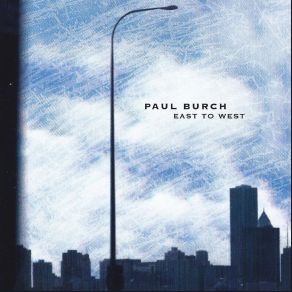East to West
Download links and information about East to West by Paul Burch. This album was released in 2006 and it belongs to Country, Alternative Country genres. It contains 12 tracks with total duration of 44:56 minutes.

|
|
|---|---|
| Artist: | Paul Burch |
| Release date: | 2006 |
| Genre: | Country, Alternative Country |
| Tracks: | 12 |
| Duration: | 44:56 |
| Buy it NOW at: | |
| Buy on iTunes $9.99 | |
| Buy on Amazon $5.99 | |
| Buy on iTunes $9.99 | |
Tracks
[Edit]| No. | Title | Length |
|---|---|---|
| 1. | Montreal | 3:15 |
| 2. | When I'm in Love | 3:08 |
| 3. | I Will Wait for You | 3:54 |
| 4. | Before the Bells | 5:20 |
| 5. | John Peel | 3:43 |
| 6. | December Sparklers | 3:14 |
| 7. | Last Dream of Will Keene | 5:23 |
| 8. | Wander | 3:38 |
| 9. | Daddy Rhythm Guitar | 2:48 |
| 10. | I'm a Takin' It Home | 3:17 |
| 11. | Little Glass of Wine | 3:25 |
| 12. | Conte Hondo | 3:51 |
Details
[Edit]Paul Burch is not usually named in discussions of alternative country or, saints forbid, Americana. He is not that scene's most well-known identity, nor, should he be. He's been banging around Nash Vegas playing clubs and doing tours whenever he can for the last decade or so. Burch is a country artist in the purist sense of the word. He may hang out with Lambchop, but his own recordings are country records. Period. Burch has quietly and unassumingly built a catalog that reflects inspiration and a consistently high quality in songwriting and performance. His last two records, 2000s Blue Notes and 2003's Fool for Love are seldom touted as classics, but they should be. They are some of the greatest one-two meditations on love and its loss in the American vernacular in the last 50 years; no hyperbole intended. Burch has a voice that is literally out of time. One can picture him singing on a Bob Wills, Webb Pierce, or Faron Young record, or hanging out as a vocalist on a Buck Owens, Willie Nelson, Ronnie Milsap, or Johnny Rodriguez album. But Burch is never mindful of the spotlight or the comparisons; he's got work to do. On East to West, he does it with a whole lot of friends. Recorded in Nashville and in England (the latter with Mark Knopfler at the guitarist's studio, to which he'd been invited). While his WPA Ballclub are the backing band here, there are a few guests, like Knopfler, including Tim O'Brien, Fats Kaplin, Richard Bennet, Kelly Hogan, and this guy some of you may know, Dr. Ralph Stanley. Stanley has been known to ask for a chair to be set up on the side of the stage when Burch is playing his set just so he could watch Burch and hear him sing.
East to West is the sound of country music that carries within it the entire burden of history, insofar as history is subjective and can be revealed in the creative life of one singer and songwriter. It's the rollicking two-step rocking country of "Montreal" which opens the set; the song reflecting a love that burned bright, fast, and spent itself without regret: "She took off her dress and gave me the slip...." It's in the strolling post-rockabilly swing of "When I'm in Love." Here, one can hear everyone from the Everly Brothers, Gram Parsons, and Emmylou Harris to Porter Wagoner and Dolly Parton as Burch and Kelly Hogan simply glide above the music, relating their fool's values that should be our own. The haunting Appalachian blues forsakes high and lonesome for backporch groove, thanks to some truly funky bouzouki played by O'Brien, and slides across the lower West Texas wastelands kissed by both gypsy blues and tragedy laden Mexican sons on "Before the Bells," with gorgeous guitar playing, electric and acoustic, by Knopfler. There's a tribute here to the late John Peel that might seem out of character, except that it contains everything that Peel loved about Burch's music, which makes it both a tribute and a very personal thank you. The high lonesome spookiness returns on "Last Dream of Will Keene"; a true modern murder ballad done in the vernacular from the other side of the grave, it features a glorious weave of stringed instruments (bouzouki and baritone guitars and upright bass) and percussion. "Wander" is a love song on which Burch plays everything. It's simple, direct, and languidly beautiful; it's pure poetry. On "Little Glass of Wine," Stanley and Burch do a bluegrass duet. The blending of those two voices with fiddles, banjos, standup bass and guitars? Enough said. But then, there's never enough said, because Burch is so mercurial yet utterly present that he's a walking, playing, singing contradiction. He is a man who sings a deeply rooted meld of American Southern music that could be coming from the radio in the parlor, yet is planted deeply in the soil of the moment. He sounds like a ghost coming over the old crystal wireless set, but could be blasting out of the CD player in your car. And East to West covers the terrain of past and present as well. This is Burch's finest moment yet, and whether the masses get it or even want it is immaterial; it's still high art, dressed in denim and dust.